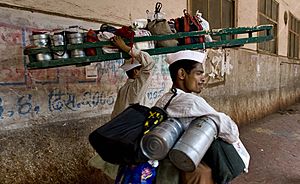Tiffin facts for kids
Tiffin is a special word from India for a type of meal. It can mean a light breakfast or a small snack in the afternoon, around 3 PM. These snacks are often foods you'd eat with tea. In some parts of India, "tiffin" can also mean your midday meal, like lunch. Sometimes it means a snack you eat between meals. If it means lunch, it's not always a light meal.
Contents
Where the Word "Tiffin" Comes From
The word "tiffin" has an interesting history. It started during the time of the British Raj in India. The British had a custom of afternoon tea. But in India, people often ate a light meal at that time instead.
The word "tiffin" comes from an old English word, "tiffing." This word meant to take a small drink. By the year 1867, people in northern British India, especially Anglo-Indians (people of mixed British and Indian heritage), started using "tiffin" to mean lunch.
How Tiffin Is Used Today
Today, "tiffin" is used differently in various parts of India and even in Nepal.
Tiffin as a Snack
In South India and Nepal, tiffin usually means a snack eaten between meals. Popular tiffin snacks include foods like dosas, idlis, and vadas. These are often light and easy to eat.
Tiffin as a Packed Lunch
In other parts of India, like Mumbai, "tiffin" often means a packed lunch. This is a meal prepared at home and carried to work or school.
In Mumbai, these packed lunches are often delivered by special people called dabbawalas. They are sometimes known as tiffin wallahs. These dabbawalas use a very complex system to deliver thousands of tiffin carriers to their destinations every day. It's an amazing system that makes sure people get their hot, homemade meals.
For many children in India, their lunch box for school is lovingly called a "tiffin box."
What's Inside a Tiffin?
When "tiffin" means lunch, it can be a full meal. It often includes rice, lentils (called dal), curry, vegetables, and chapatis (a type of flatbread). Sometimes it also has spicy meats. The containers used to carry these meals are called tiffin carriers, tiffin-boxes, or just tiffins. They are usually stacked metal containers that keep the food warm.
See also
 In Spanish: Tiffin para niños
In Spanish: Tiffin para niños
 | Jessica Watkins |
 | Robert Henry Lawrence Jr. |
 | Mae Jemison |
 | Sian Proctor |
 | Guion Bluford |


